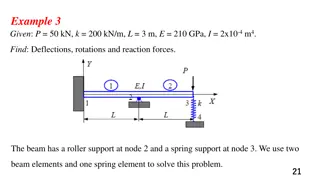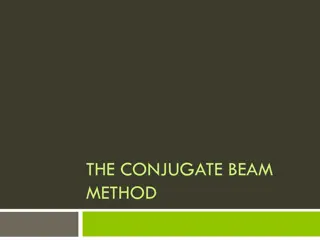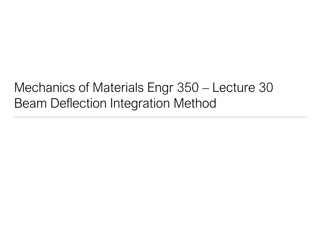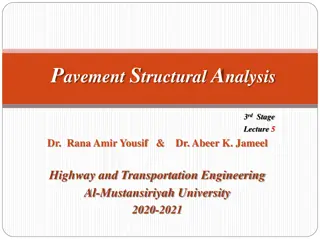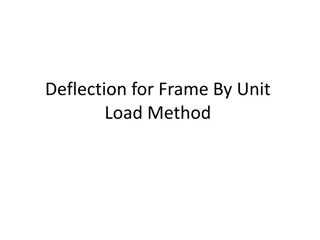Engineering Beam Analysis using Finite Element Method
Solve beam analysis problems involving deflections, rotations, and reaction forces using the finite element method. The examples provided cover scenarios with roller supports, spring supports, and internal hinges. Learn how to determine displacements, rotations, and element forces in beams of varyin
6 views • 42 slides
The Conjugate Beam Method in Structural Analysis
The Conjugate Beam Method is a powerful technique in structural engineering, derived from moment-area theorems and statical procedures. By applying an equivalent load magnitude to the beam, the method allows for the analysis of deflections and rotations in a more straightforward manner. This article
5 views • 11 slides
Beam Deflection and Integration Method in Mechanics of Materials
Understanding beam deflection through integration method involves analyzing relationships between moment, deflection, slope, and shear in a beam structure. By integrating the moment equation under certain assumptions and boundary conditions, engineers can determine deflections and solve for constant
18 views • 12 slides
Ocean Currents and Their Impact
Dive into the world of ocean currents with Assistant Professor Biplab Majumdar as he explores the different types of currents, such as surface and deep water currents. Discover how surface currents are influenced by factors like global wind patterns, the Coriolis effect, and continental deflections,
2 views • 19 slides
Nonlinear Analysis of Pavement Structural Stresses and Deflections
Explore the effect of nonlinearity in granular materials on vertical stresses and deflections in pavement structural analysis. Learn about iterative methods and stress invariants to understand pavement behavior under traffic loads. Discover the application of Boussinesq's solutions and Burmister's l
3 views • 20 slides
Deflection for Frame by Unit Load Method
In structural engineering, deflection of a frame by unit load method is a crucial analysis technique. By applying a unit load at different points in a frame and determining the resulting deflections, engineers can assess the stiffness and performance of the structure. Through this method, critical i
10 views • 4 slides
Structural Analysis Methods and Procedures
Explore the consistent deformation method, method of virtual work, and force method of analysis for indeterminate structures. Learn about writing equations, satisfying compatibility requirements, and applying principles to determine unknown forces and displacements. Follow step-by-step procedures to
3 views • 17 slides
Aeroelastic Prediction Workshop 3 Large Deflection Group Update
Explore the latest developments in the Aeroelastic Prediction Workshop 3's Large Deflection Group, focusing on nonlinear aeroelasticity and its impact on structural deflections. Discover the goals, members, and ongoing projects of this innovative group.
3 views • 7 slides
Pavement Structural Analysis Insights
Explore the structural analysis of pavements in highway engineering, focusing on stresses, strains, and deflections under various loading conditions. Learn how to determine critical stresses and deflections at different points on a pavement surface. Dive into examples illustrating stress calculation
1 views • 13 slides
